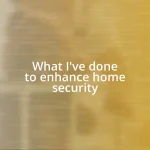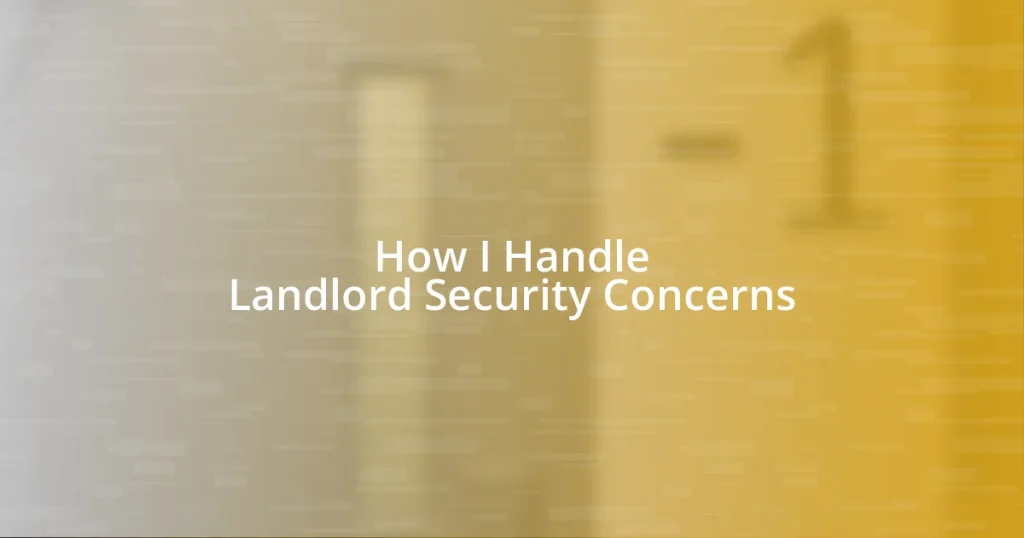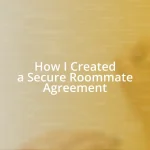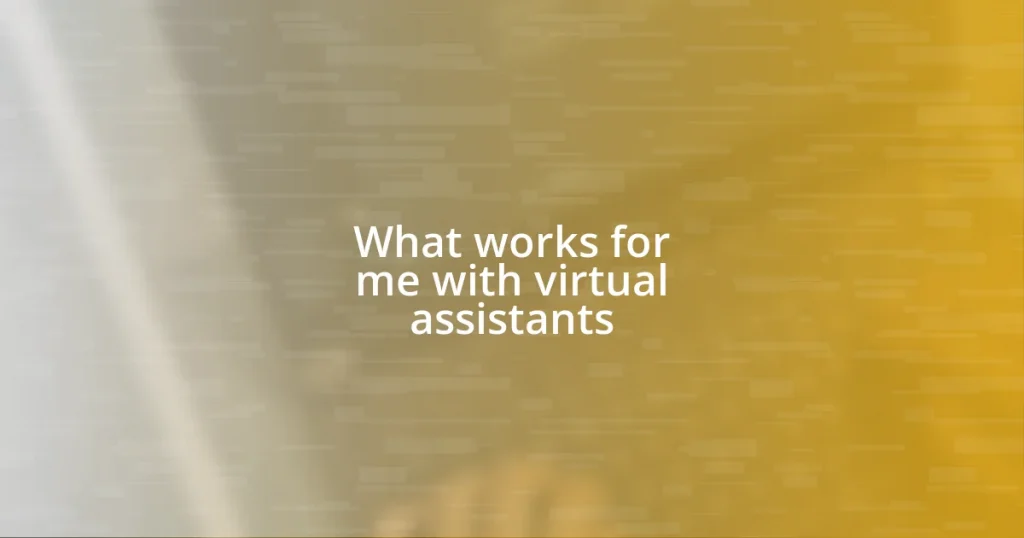Key takeaways:
- Establishing effective communication with tenants, through regular check-ins and open feedback channels, fosters trust and encourages them to express security concerns.
- Documenting security incidents allows landlords to identify patterns and improve safety measures while empowering tenants through transparency and collaboration.
- Engaging with local authorities and regularly reviewing security policies are crucial for staying informed about neighborhood safety trends and ensuring that security measures meet current needs.
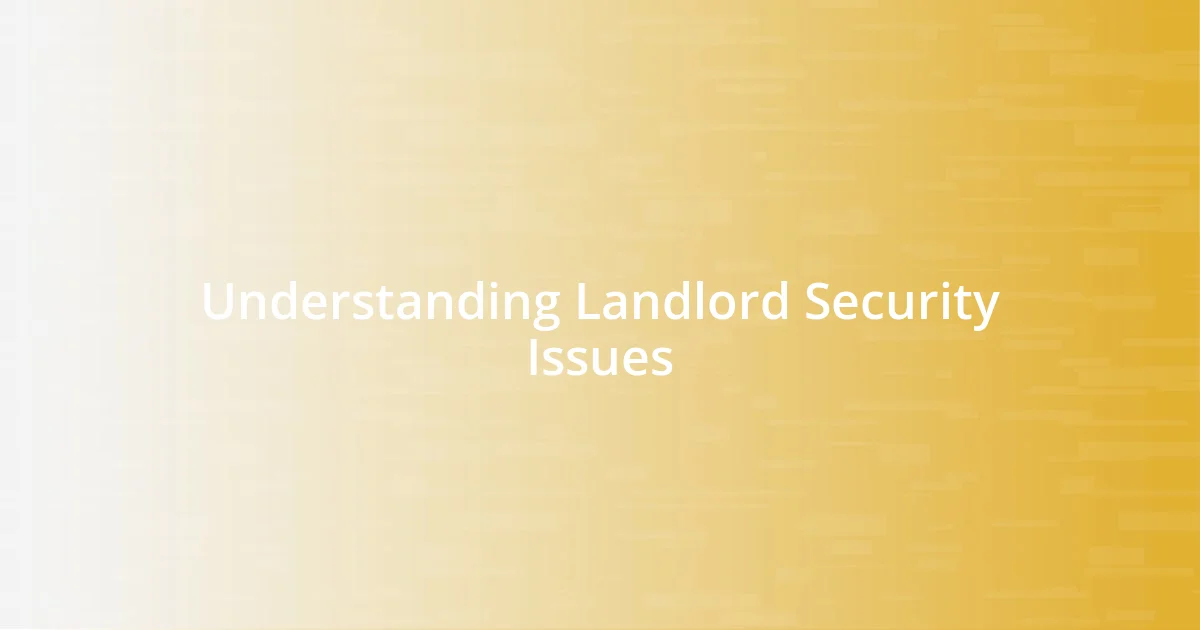
Understanding Landlord Security Issues
Landlord security issues can feel overwhelming at times, especially when you’re entrusted with someone else’s property. I remember the first time I had to address a security concern in one of my rentals—a broken front gate. It just made me stop and think: how could I ensure my tenants felt safe? This made me realize that security is not just about physical barriers; it’s about peace of mind.
One of the biggest challenges in understanding these issues is that they often stem from a lack of communication. Have you ever had a tenant voice a concern, and you weren’t entirely sure how to handle it? I’ve found that being proactive—like conducting regular safety checks and encouraging tenants to share their worries—can really foster trust. This approach not only mitigates risks but also reinforces the idea that as a landlord, I genuinely care about the tenants’ well-being.
Finally, the emotional impact of security concerns deserves recognition. Tenants want to feel at home, and when security issues arise, it can disrupt that sense of safety. I’ve experienced tenants expressing anxiety about break-ins, which led me to reevaluate my own security protocols. Each scenario reinforced my commitment to providing a secure living environment that supports a community, rather than just a rental space.
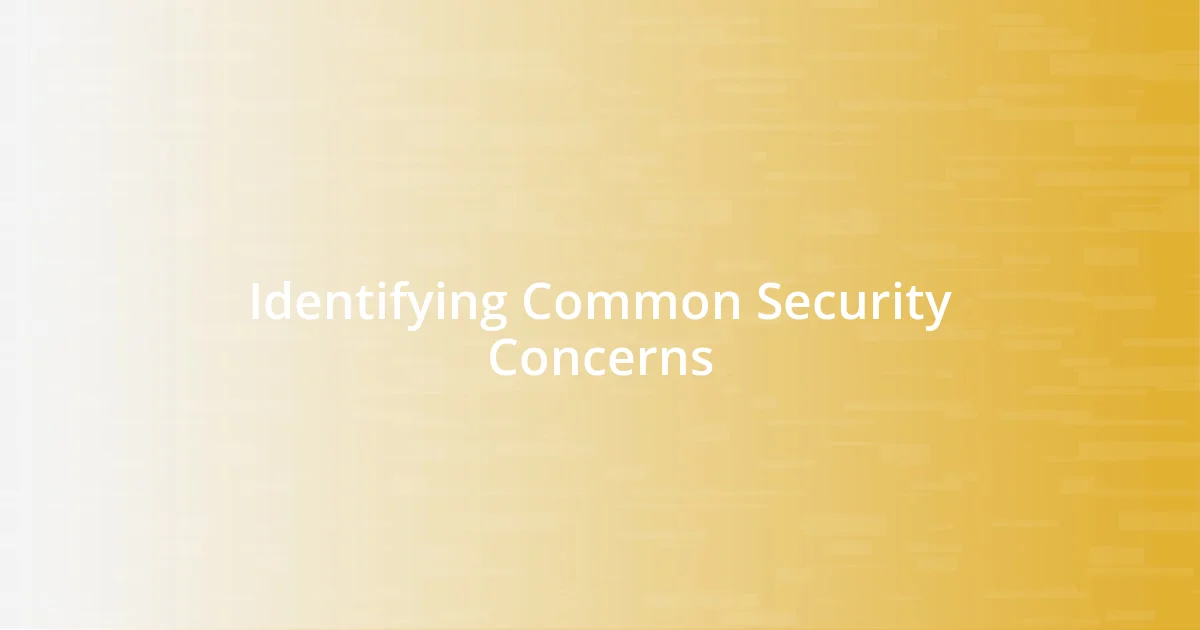
Identifying Common Security Concerns
Identifying common security concerns can be a bit like peeling an onion—there are layers of issues that need to be addressed. I recall a situation where I discovered that an outdoor lighting system was malfunctioning. After a quick chat with my tenant, I learned that they felt uneasy walking to their car at night. This simple issue highlighted how inadequate lighting can create an environment of fear, even if the area is generally safe.
Another prominent concern revolves around the physical security of the property itself. I once had a tenant express worries about the locks on their doors, which had not been changed in years. It took me back to my early days of managing properties—where I fully realized that outdated locks can make even the most secure home feel vulnerable. Investing in modern locking systems not only enhances security but shows tenants that their safety is my priority.
Lastly, there can be a significant psychological aspect to security concerns. When a neighbor experienced a break-in, I noticed that anxiety rippled through the entire complex. This incident prompted me to host a security workshop, allowing tenants to voice their fears and discuss preventive measures together. Fostering an open dialogue helped create a sense of community while enhancing overall security awareness among tenants.
| Type of Concern | Examples |
|---|---|
| Physical Security | Locks, windows, and doors |
| Environmental Factors | Lighting, visibility, and surrounding areas |
| Psychological Factors | Recent incidents, perception of safety |
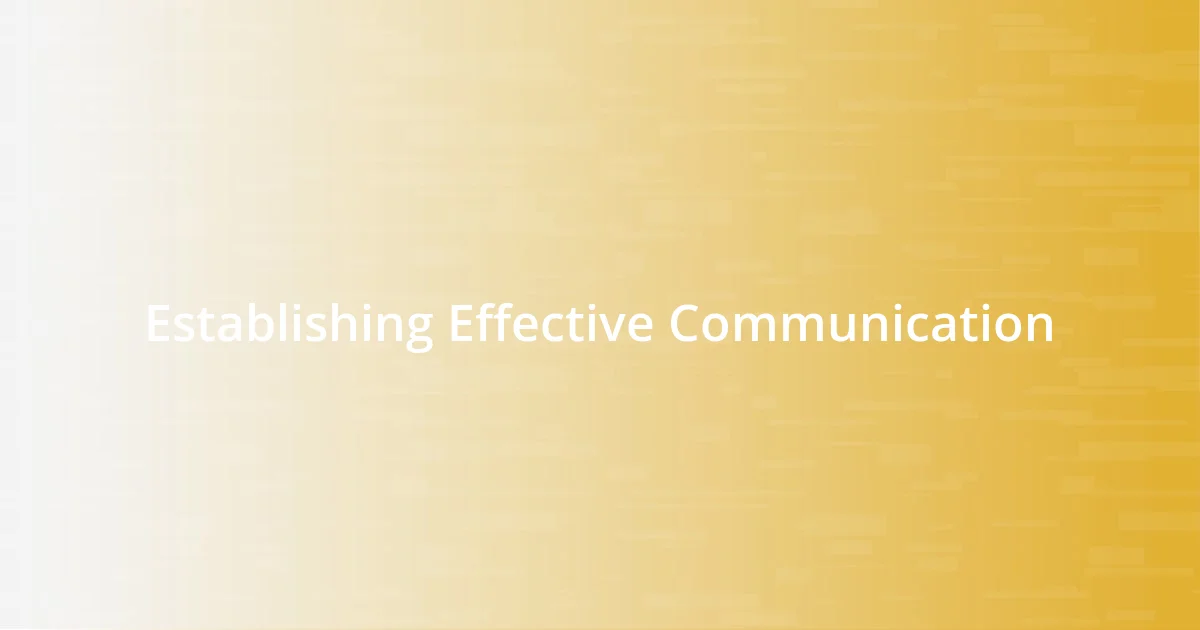
Establishing Effective Communication
Establishing effective communication with tenants is essential to alleviate their security concerns. When I first managed a multi-unit building, I quickly realized that a simple follow-up call after addressing an issue could go a long way. I vividly remember one tenant thanking me for taking the time to ask if they felt secure after we upgraded the entryway locks. That interaction not only built trust but made them feel valued, creating a stronger landlord-tenant relationship.
To foster this kind of communication, consider these strategies:
- Regular Check-Ins: Schedule periodic meetings or phone calls to discuss any concerns that may arise.
- Open Feedback Channels: Provide a dedicated email or messaging option for tenants to voice their worries at any time.
- Transparent Updates: Keep tenants informed about any security measures being implemented or any incidents that occur.
- Encourage Group Discussions: Organize community meetings where tenants can share their perspectives openly.
- Be Approachable: Always present yourself as someone who’s willing to listen and take action on their concerns.
By prioritizing effective communication, I found that I not only identified security issues more promptly but also built a community where tenants felt secure enough to share their fears and experiences.
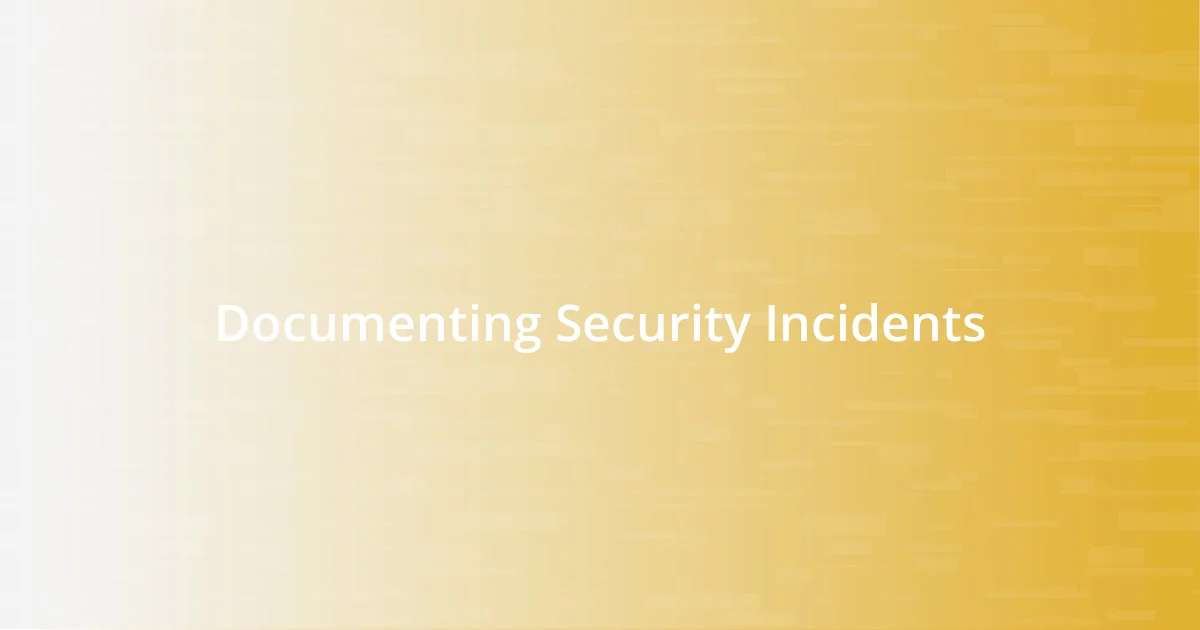
Documenting Security Incidents
Documenting security incidents is crucial for both managing properties effectively and fostering a safe environment for tenants. I remember a time when one of my tenants reported a suspicious person lingering around the parking lot. Instead of brushing it off, I made a note of the time, date, and details of the incident. This not only helped me stay informed but also provided essential information if similar reports surfaced later.
Whenever a security concern arises, I think it’s essential to create a detailed account of the situation. I’ve found that even seemingly small incidents can contribute to a larger pattern. For example, after documenting several reports of vandalism around the property, I was able to analyze the timing and location of each occurrence, uncovering a trend that allowed me to improve security measures proactively. Have you ever thought about how much information can be gleaned from a well-kept record?
In my experience, sharing these documented incidents with tenants can be incredibly empowering. When I communicated the recorded incidents during a safety meeting, my tenants appreciated the transparency; they felt more invested in creating a secure environment together. This collaborative approach not only built trust but also encouraged everyone to keep an eye out for any unusual activity. The process of documenting not only safeguards the property but also fosters a sense of community among tenants.
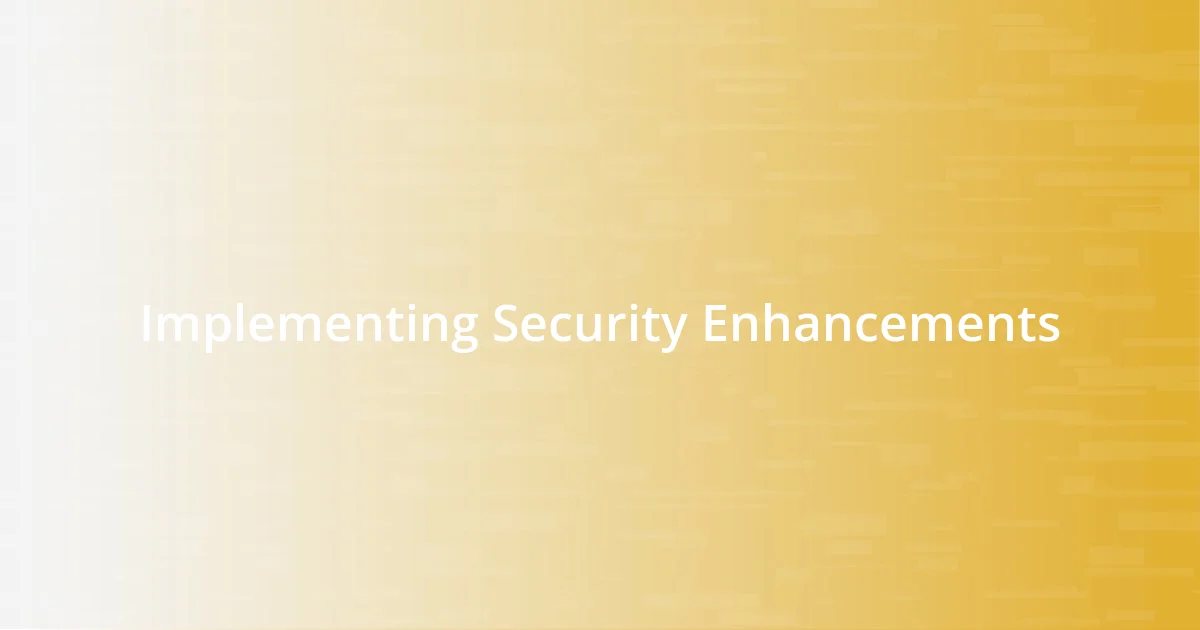
Implementing Security Enhancements
Implementing security enhancements has always been a top priority for me as a landlord. I recall a particular instance when I decided to install security cameras in common areas, like the hallways and parking lot. Initially, some tenants were apprehensive, raising concerns about privacy. I took the time to address their worries by explaining how these cameras were purely for their safety and would not invade personal spaces. After witnessing the installation, their fears shifted to relief, knowing that we were taking proactive steps to deter crime.
In my experience, investing in better lighting has also proven invaluable. I remember a tenant mentioning they felt uneasy walking to their car at night due to poor visibility. Taking that feedback to heart, I arranged for brighter motion-sensor lights to be installed along the walkways. Not only did this change make those paths safer, but I could see the positive impact on my tenants’ sense of security. Can you imagine how a simple light can change the way someone feels at home?
Furthermore, I often encourage tenants to participate in a neighborhood watch program. During one community meeting, a tenant shared how having regular safety talks enhanced their feeling of security. This collaborative approach not only fosters a sense of community but also empowers tenants to contribute ideas on enhancing safety. When everyone is involved, it creates a shared responsibility where security becomes a collective effort, rather than just my job as the landlord.
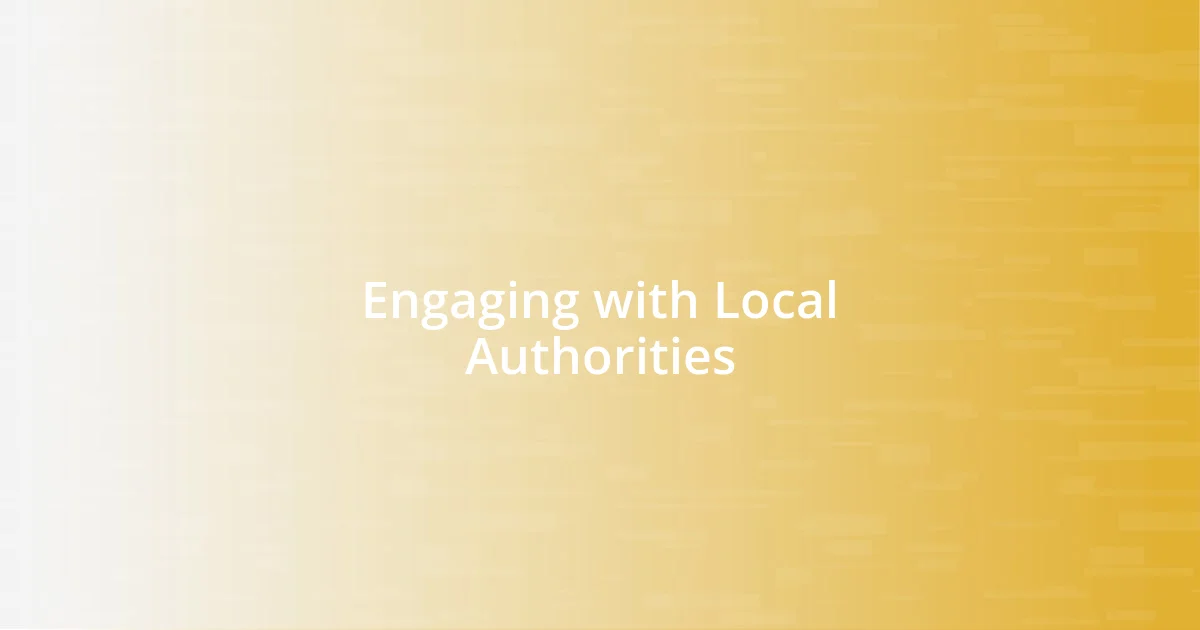
Engaging with Local Authorities
Engaging with local authorities can be a transformative step in effectively addressing security concerns. I remember a time when I reached out to the local police to discuss recent neighborhood crime patterns. The officers not only appreciated my initiative but also provided invaluable insights and resources that I hadn’t considered before. Have you ever thought about how those in law enforcement can become allies in fostering a safer community?
In addition to communication about security issues, I’ve found that attending community policing meetings can be eye-opening. During one such meeting, I voiced the concerns my tenants had regarding late-night disturbances. The officers responded with practical advice on how to mitigate these issues and offered to conduct walkthroughs of the property. I walked away feeling more connected and supported; it was reassuring to see that our local authorities genuinely cared about the wellbeing of residents. Isn’t it encouraging to realize how proactive communication can lead to actionable solutions?
When I noticed persistent security issues affecting my property, I arranged for a formal meeting with local government officials. I shared my experiences and sought their guidance on potential funding for security upgrades. To my surprise, they not only provided options but were enthusiastic about collaborating on community safety initiatives. This experience taught me that strong relationships with local authorities can lead to impactful changes, ensuring that the security of both my tenants and the broader community is a shared priority.
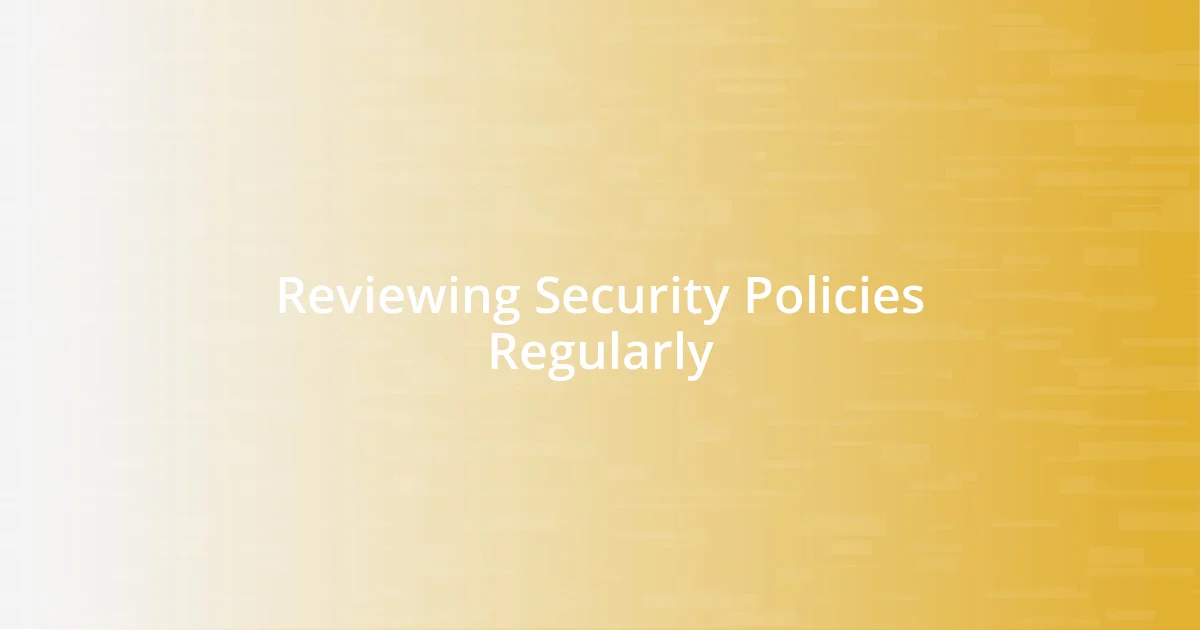
Reviewing Security Policies Regularly
Regularly reviewing security policies is essential for maintaining a safe living environment. I personally schedule quarterly reviews of our security measures to ensure they align with current needs. I recall one review where I discovered that the locks on some rental units were outdated and required immediate attention. After replacing those locks, I felt a wave of relief knowing my tenants were better protected.
It’s interesting how a simple policy check can spark important conversations. During a recent meeting with tenants, we discussed the effectiveness of our security protocols. I was surprised when a tenant brought up how a policy on guests could be tightened, leading to a more secure atmosphere. It’s moments like these that highlight the importance of transparency; when tenants feel they can speak up, it empowers everyone to contribute to their safety.
Additionally, I make it a point to stay updated on any crime trends in our area. After hearing about a rise in local break-ins, I quickly reviewed our security policy regarding exterior lighting and alarm systems. This proactive approach not only instills confidence in my tenants, but it also reassures me as a landlord that I am taking the necessary steps to protect my property. Isn’t it fascinating how staying informed and being adaptable can make all the difference?

